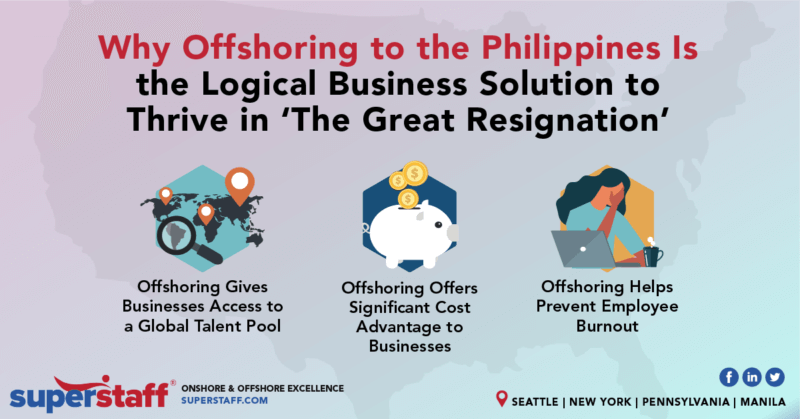
Employees are quitting. Wages are rising. Businesses are struggling.
The U.S. labor market has entered an unprecedented era of “The Great Resignation,” a term coined by Texas A&M University management professor Antony Klotz, who first saw the then-forthcoming trend in May 2021. And indeed, he was right. The U.S. labor market is currently at its tightest in more than three decades.
According to the U.S. Bureau of Labor Statistics, the last business days of November 2021 saw 10.6 million job openings. The number of hires virtually remained the same since September at 6.7 million. Total separations also increased to 6.3 million, with a 3.0% increase in voluntary quit rates—matching the record-high numbers in September 2021.
With more job vacancies than applicants, the labor market has employers facing compounding problems. On top of the list is the increasing demand for higher wages.
Talent competition pushes wages higher. In three months through September 2021, wages in the U.S. increased by 4.2% than a year earlier—the fastest-recorded hike since 1990.
Many anticipate “The Great Resignation” to further widen the talent shortage in 2022. Left unaddressed, it could hamper not only the growth of American businesses but the U.S. economy as a whole. Fortunately, there is a solution worth exploring, and it is the same solution that has historically helped numerous U.S. enterprises bounce back from various business and economic issues: offshoring.
Why Offshoring to the Philippines Is the Logical Business Solution to Thrive in ‘The Great Resignation’

#1: Offshoring Gives Businesses Access to a Global Talent Pool
With a limited pool of onshore candidates, U.S. businesses can overcome hiring challenges by expanding options to include offshore talents. Companies that outsource to the Philippines empower their businesses with employees that display solid English communication skills, a firm grasp of western culture, advanced tech know-how, and, best all, impeccable work ethics.
#2: Offshoring Offers Significant Cost Advantage to Businesses
Outsourcing is an excellent strategy to offset the increasing rates of wages among core onshore teams and other onshore operational expenses. Offshoring to the Philippines enables businesses to reduce one of their most expensive overhead: labor costs.
Since business space leases and rentals are also significantly lower in the Philippines, companies that outsource can save up to 60% on operational expenses.
#3: Offshoring Helps Prevent Employee Burnout
The “Great Resignation” has triggered a ripple effect in many organizations in the U.S. As employees quit in droves, remaining staffers are burdened with more work—taking on three times more workloads than they used to handle. This puts them at risk of burnout and on the brink of resignations themselves, further perpetuating the talent gap within organizations.
By delegating tasks that take a considerable amount of time to accomplish offshore, employers afford their onshore employees less pressure and more time to focus on their core expertise.
Do You Want to Learn More About ‘The Great Resignation’?
To gain in-depth insights about “The Great Resignation” and how businesses can overcome its challenges through offshoring, download ‘The Great Resignation’: The Full Picture.






